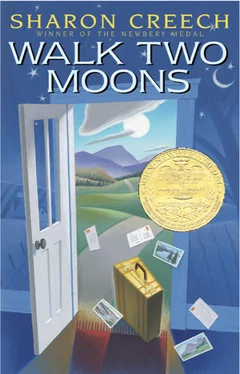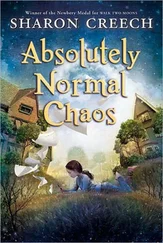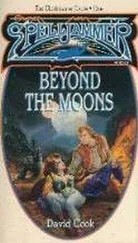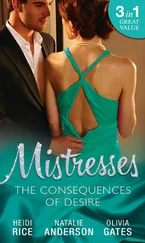When I knocked at Phoebe’s door, Ben said, “I’ll be going now.” I took a quick look at him and turned back to the door, but in that instant that I was turning my head, he leaned forward, and I do believe his lips kissed my ear. I was not sure this was what he intended. In fact, I was not sure it happened at all, because before I knew it, he had hopped down the steps and was walking away.
The door inched open and there was Phoebe’s round face, as white and frightened as ever you could imagine. “Quick,” she said. “Come in.” She led me into the kitchen. On the kitchen table was an apple pie, and beside it were three envelopes: one for Phoebe, one for Prudence, and one for their father.
“I opened my note,” Phoebe said, showing it to me. It said, Keep all the doors locked and call your father if you need anything. I love you, Phoebe. It was signed, Mom .
I didn’t think too much of it. “Phoebe—” I said.
“I know, I know. It doesn’t sound terrible or anything. In fact, my first thought was, ‘Well, good. She knows I am old enough to be here by myself.’ I figured she was out shopping or maybe she even decided to return to work, even though she wasn’t supposed to go back to Rocky’s Rubber until next week. But then Prudence came home and opened her note.”
Phoebe showed me the note left for Prudence. It said, Please heat up the spaghetti sauce and boil the spaghetti. I love you, Prudence. It was signed, Mom.
I still didn’t think too much of it, but Phoebe was suspicious. Prudence made the spaghetti, while I helped Phoebe set the table. Phoebe and I even made a salad. “I do feel sort of independent,” Phoebe said.
When Phoebe’s father came home, Phoebe showed him his note. He opened it and sat down, staring at the piece of paper. Phoebe looked over his shoulder and read his note aloud: I had to go away. I can’t explain. I’ll call you in a few days.
I had a sinking, sinking feeling.
Prudence started asking a million questions. “What does she mean? Go away where? Why can’t she explain? Why didn’t she tell you? Did she mention this? A few days ? Where did she go?”
“Maybe we should call the police,” Phoebe said. “I think she was kidnapped or something.”
“Oh, Phoebe,” Mr. Winterbottom said.
“I’m serious,” she said. “Maybe a lunatic came in the house and dragged her off—”
“Phoebe, that is not funny.”
“I’m not being funny. I mean it. It could happen.”
Prudence was still asking her questions. “Where did she go? Why didn’t she mention this? Didn’t she tell you? Where did she go?”
“Prudence, I honestly cannot say,” her father said.
“I think we should call the police,” Phoebe repeated.
“Phoebe, if she was kidnapped, would the lunatic—as you say—allow her to sit down and write these notes? Mm?”
He stood up, removed his coat, and said, “Let’s eat.”
As I left, Phoebe said, “My mother has disappeared. Sal, don’t tell anyone. Don’t tell a soul.”
At home, my father was slumped over the photo album. He used to close the album quickly when I came in the room, as if he were embarrassed to be caught with it. Lately, however, he didn’t bother to close it. It was as if he didn’t have the strength to do that.
On the opened page was a photo of my father and mother sitting in the grass beneath the sugar maple. His arms were around her and she was sort of folded into him. His face was pressed up next to hers and their hair blended together. They looked like they were connected.
“Phoebe’s mother went away,” I said.
He looked up at me.
“She left some notes. She says she’s coming back, but I don’t believe it.”
I went upstairs and tried to work on my mythology report. My father came to the doorway and said, “People usually come back.”
Now I can see that he was just talking in general, just trying to be comforting, but then—that night—what I heard in what he said was the tiniest reassurance of something I had been thinking and hoping. I had been praying that a miracle would happen and my mother would come back and we would return to Bybanks and everything would be exactly as it used to be.
At school the next day, Phoebe wore a fixed expression: a sealed, thin smile. It must have been hard for her to maintain that smile, because by the time English class came around, her chin was quivering from the strain. She was extremely quiet all day. She didn’t speak to anyone but me, and the only thing she said to me was, “Stay at my house tomorrow night.” It wasn’t a question; it was a command.
Mr. Birkway gave us a fifteen-second exercise. As fast as we could, without thinking, we were to draw something. He would tell us what we were to draw when everyone was ready. “Remember,” he said. “ Don’t think. Just draw. Fifteen seconds. Ready? Draw your soul . Go.”
We all wasted five seconds staring blankly back at him. When we saw that he was serious and was watching the clock, our pencils hit the paper. I wasn’t thinking. There wasn’t time to think.
When Mr. Birkway called “Stop!” everyone looked up, dazed. Then we looked down at our papers, and a buzz went around the room. We were surprised at what had come out of our pencils.
Mr. Birkway zipped around, scooping up the papers. He shuffled them and tacked them up on the bulletin board. He said, “We now have everyone’s soul captured.” We all crowded around.
The first thing I noticed was that every single person had drawn a central shape—a heart, circle, square, or triangle. I thought that was unusual. I mean, no one drew a bus or a spaceship or a cow—they all drew these same shapes. Next, I noticed that inside each figure was a distinct design. At first it seemed that every one was different. There was a cross, a dark scribble, an eye, a mouth, a window.
There was one with a teardrop inside that I thought must be Phoebe’s.
Then Mary Lou said, “Look at that—two are exactly the same.” People were saying, “Geez” and “Wow” and “Whose are those?”
The duplicate designs were: a circle with a large maple leaf in the center, the tips of the leaf touching the sides of the circle. One of the maple leaf circles was mine. The other was Ben’s.
Ispent the next night at Phoebe’s house, but I could hardly sleep. Phoebe kept saying, “Hear that noise?” and she would jump up to peer out the window in case it was the lunatic returning for the rest of us. Once she saw Mrs. Cadaver in her garden with a flashlight.
I must have fallen asleep after that, because I awoke to the sound of Phoebe crying in her sleep. When I woke her, she denied it. “I was not crying. I most certainly was not.”
In the morning, Phoebe refused to get up. Her father rushed into the room with two ties slung around his neck and his shoes in his hand. “Phoebe, you’re late.”
“I’m sick,” she said. “I have a fever and a stomachache.”
Her father placed his hand on her forehead, looked deep into her eyes and said, “I’m afraid you have to go to school.”
“I’m sick. Honest,” she said. “It might be cancer.”
“Phoebe, I know you’re worried, but there’s nothing we can do but wait. We have to go on with things. We can’t malinger.”
“We can’t what?” Phoebe said.
“Malinger. Here. Look it up.” He tossed her the dictionary from her desk and tore down the hall.
“My mother is missing, and my father hands me a dictionary,” Phoebe said. She looked up malinger and read the definition: “‘To pretend to be ill in order to escape duty or work.’” She slammed the book shut. “I am not malingering.”
Читать дальше












